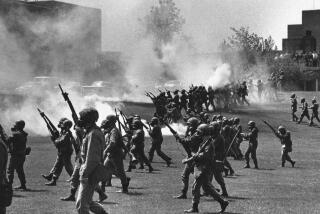‘It’s Real Now,’ Troops Say as Bullets Start to Fly
- Share via
KUFA, Iraq — By half past noon, there was a fair amount of grumbling as the soldiers huddled in the back of a military truck, munching MRE rations. They’d been manning traffic checkpoints for hours, a tedious chore they’d already performed numerous times since arriving in Iraq this year.
The night before, their commander had promised this mission would be different -- that the soldiers would see action as they swept a palm grove along the Euphrates River for members of an Iraqi militia.
“Guaranteed contact,” the commander had assured them. “Ninety-nine percent chance.” They were mocking his prediction when the first rocket-propelled grenade hit a U.S. tank up the road, followed by a barrage of small-arms fire that struck one soldier in the head.
“It’s real now,” said Spc. Jay Thomas, 22, of Ridgeville, Ind.
Within an hour, the fight against the Al Mahdi army, followers of Shiite Muslim cleric Muqtada Sadr, had drifted down the road to where a company of about 120 soldiers with the 1st Battalion, 14th Infantry Regiment, had surrounded a palm and date grove. U.S. forces believed Sadr’s men were hiding in the grove.
For the next four hours, the soldiers got more contact with the enemy than they had bargained for. Unlike the usual skirmishes with insurgents, the 50 to 100 Al Mahdi fighters held their positions, even as the U.S. pummeled the grove with 150 mortars. Three U.S. soldiers were wounded. An estimated 20 to 40 Al Mahdi fighters were killed, the military said.
The battle outside the Shiite holy city of Kufa on Friday marked first time many of the soldiers had seen combat or fired a shot. Their division, the 25th Infantry, hadn’t seen combat since Vietnam.
“When you hear gunshots and bombs going off for the first time, it’s no longer a movie,” said Sgt. Ira Pula, a platoon leader.
Soldiers said their training and drills had prepared them well. But some experiences can never be simulated. The heat and smell of propellant fumes as an RPG whooshes by your head. The sound of bullets bouncing off asphalt. Seeing a buddy’s face covered in blood.
“You can’t train for some things,” said Spc. David Bland, 21, of San Francisco, who manned a truck-mounted M249 light machine gun throughout the fight. “To actually shoot someone is different. To see them shot, fall to the ground and then see blood come out. I’ll never forget it. My heart was beating pretty fast.”
When the platoon was attacked, soldiers scattered for cover and began returning fire. They said there was little time to think, they simply reacted, as they had during training at their home base in Hawaii.
After a while, some soldiers said their initial fear was replaced by a sense of exhilaration.
“I was in a full adrenaline rush,” said Pfc. Ian Barton, 19, of Reno. “Nothing else mattered. I wanted to kill something. After the first few minutes, I started to have fun with it.”
Thomas, his platoon partner, agreed. “I was smiling,” he recalled. But as the battle raged, the pressure began to build. Mortar crews were taking a while to fine-tune their aim. The shells first landed as much as half a mile off their mark, and one hit less than 40 yards from the platoon.
It became difficult to separate Al Mahdi fighters from villagers because the militia members dressed as civilians and would sometimes drop their weapons and raise their hands, pretending to surrender. After they had escaped, the fighters would pick up weapons and rejoin the fight, soldiers said.
“It’s a tough call,” Barton said. “I had this guy in my sights a few times, but let him go. Then he picked up an RPG launcher.”
That rocket-propelled grenade attack turned the soldiers’ mood once again, this time to anger. The grenade hit a metal gate, sending a spray of shrapnel into the neck and body of Pfc. Chan Hua Chiu, 19, of New York. A concrete wall collapsed on another soldier. A piece of shrapnel shot into Bland’s belt.
As a medic treated Chiu, the soldiers redoubled their effort.
“After seeing a buddy down like that, it got real,” said Spc. Frankie Aguirre, 22, of Anaheim. “I was angry. But I knew Chiu was going to be OK because all he wanted was a cigarette.” Chiu was flown to a combat hospital in Balad, where he is recovering.
Thomas looked across the river and saw scores of Al Mahdi army reinforcements attempting to cross the bridge. “I lit up the bridge,” he said.
But the anger was mixed with a new anxiety. Thomas said he thought about his wife and year-old child, with whom he’s only been able to spend two weeks.
“I didn’t want to get shot,” Thomas said. “I was thinking about them.”
When the fighting began to move toward the border of the holy city, orders came from their commanders to withdraw.
The ride back to camp was silent at first, then gradually the soldiers began talking about the experience, reliving events, comparing notes.
Living together for months had already brought them close together, but the shared experience created a new level of intimacy. “Now we know we can trust each other,” Aguirre said. “I have confidence in these guys.”
For some, the fight whetted an appetite for action.
“I’m ready to go back out again,” Barton said. “I want to blow up as many as I can.”
Others said they’d had their fill. “It’s one of those things you can say you’ve done,” Bland said. “But I’ll be happy if I never do it again.”
More to Read
Sign up for Essential California
The most important California stories and recommendations in your inbox every morning.
You may occasionally receive promotional content from the Los Angeles Times.













